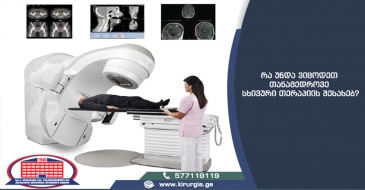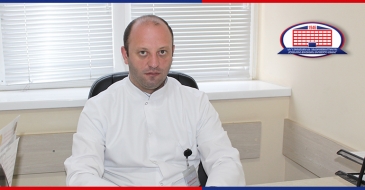
The National Center of Surgery's most challenging procedure
A 64-year-old woman was taken to the National Center of Surgery with abdominal swelling and overall weakness. The patient's abdomen was so enlarged and heavy that she had difficulties moving, lost her capacity to live an active life, and had no joy.
Following a surgeon's evaluation, radiological investigations were conducted, and tumor pathologies were detected based on the results of an ultrasound examination, and computed tomography of the abdomen was also performed for a more detailed and delicate investigation.
According to research, was shown a large ovarian cystoma and uterine leiomyoma, on the one hand, and giant-sized, so-called tumor growth in the area of the retroperitoneum, which spanned practically the entire abdomen, put pressure on the organs in the abdominal cavity and their displacement, on the other.
A group of oncologists (Gigo Pichkhaia, Davit Jimsheleishvili) and gynecologists (Malvina Chigogidze, Maia Gogoladze) planned a surgical treatment based on the tumor board principle, to determine treatment strategies.
Furthermore, the issue of anesthesia's complexity and the criteria governing its administration were predetermined. In addition to the anesthesiologist, an additional assistant was present during the procedure.
It was extremely difficult for the surgeons to remove the tissues or healthy organs surrounding this hopeless growth without damaging them or the main blood vessels, especially when the tumor and surrounding organs expanded and recovered, which considerably reduced the likelihood of the surgery being completed successfully.
The procedure was carried out in strict accordance with oncology principles, following all relevant regulations, and with all necessary safety precautions. As a consequence, the National Center of Surgery's surgical team celebrated yet another victory!
A uterine and massive tumor weighing eight kilograms was identified after three hours of labor with no complications!
The patient was under continual medical observation after an unprecedented oncological procedure because there was a risk of postoperative complication, but with proper treatment, the woman became active within two days and was soon discharged from the clinic in satisfactory health.
The National Center of Surgery wishes you health!
What are patients interested in
Chemotherapy
Qauestion:: Hello, My mother received several courses of chemotherapy, because of metastatic involvement of bone and liver. During that time platelet count significantly decreased and only presented with small skin hemorrhages. In chemotherapy, platelet count sometimes increases or decreases, she simultaneously takes Revolade (50mg) on a daily basis and underwent platelet transfusion several times that had an only short-term effect. Is it possible to find another solution for the mentioned problem at your clinic? Thanks in advance











